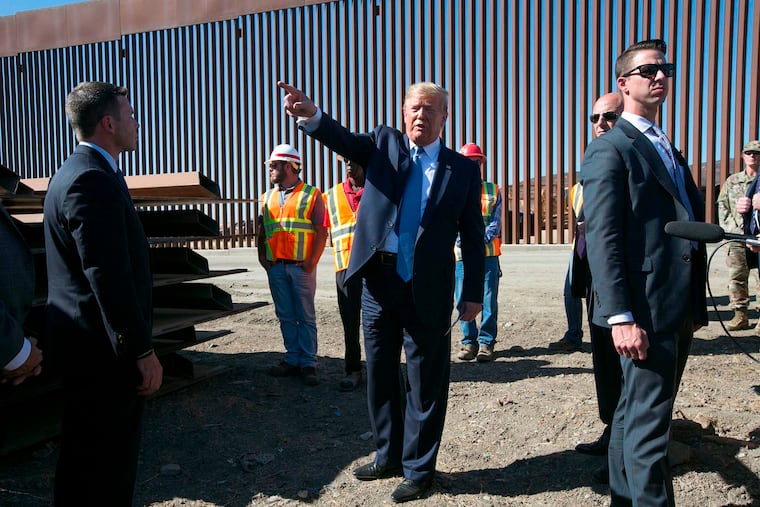Trump seeks to divert more Pentagon money to border wall construction
The plan would pay for a further 177 miles of wall construction by taking the money from Pentagon accounts earmarked to buy fighter aircraft, vehicles, warships and other big-ticket weapons systems, the document showed.

WASHINGTON — The Trump administration is seeking to shift $3.8 billion more from the defense budget to pay for constructing a wall along the U.S.-Mexico border, the Pentagon notified Congress on Thursday, immediately provoking bipartisan objections for a second year.
The plan would pay for a further 177 miles of wall construction by taking the money from Pentagon accounts earmarked to buy fighter aircraft, vehicles, warships and other big-ticket weapons systems, the document showed.
The Department of Homeland Security “has identified areas along the southern border of the United States that are being used by individuals, groups and transnational criminal organizations as drug smuggling corridors,” the Pentagon document said in trying to justify the shift on national security grounds. “Construction of additional physical barriers and roads in the vicinity of the United States border is necessary.”
President Donald Trump, running for reelection, is eager to show progress on the project that was perhaps the No. 1 promise of his 2016 campaign. He vowed as a candidate that Mexico would pay for the wall, but as president he turned instead to the Pentagon’s deep pockets.
Last year, he sought to take money from military housing and base construction. This year, by targeting spending for weapons, his proposal drew even more opposition in Congress, from lawmakers in both parties who guard such defense contracts for their job-creation benefits as much as for national security.
“President Trump and his Administration have spent months trying to take critical resources away from our Armed Forces,” Senate Minority Leader Charles E. Schumer, D-N.Y., and House Speaker Nancy Pelosi, D-Calif., said in a statement. “Congress, not the President, has the power of the purse — a power that cannot be nullified so the President can fulfill an outrageous campaign promise.”
Rep. Mac Thornberry of Texas, the top Republican on the House Armed Services Committee, immediately pushed back as well. His state is home to Lockheed Martin production facilities for the F-35 fighter.
“Congress has the constitutional responsibility to determine how defense dollars are spent,” Thornberry said in a statement. “The re-programming announced today is contrary to Congress’ constitutional authority, and I believe that it requires Congress to take action.”
Lawmakers repeatedly sought to block Trump’s attempts to tap Pentagon funds last year. The president argued that he had authority to use military funds because of what he deemed a national security emergency along the border, a claim that federal courts are still reviewing.
The dispute has slowed but not blocked all Pentagon funding from being shifted to wall construction.
Congress is likely to try again to prevent the latest funding shift, and lawsuits from outside groups are all but certain.
“Multiple courts have ruled that it is illegal for Trump to pillage military funds for his xenophobic border wall,” an attorney for the American Civil Liberties Union said in a statement. “We’ll be back in court to block these additional, unauthorized transfers.”
In the latest proposal, Air Force and Navy aviation take the brunt of the proposed cuts. They would force cancellation of four F-35 and F-22 fighters, two MV-22 Ospreys, four C-130J cargo planes and eight MQ-9 Reaper drones, which are built by San Diego’s General Atomics.
The Pentagon request also strips $156 million in additional funds for the F-35, $180 million for an Air Force light attack aircraft, $650 million for amphibious assault ships and nearly $300 million for Army vehicles. Another $1.5 billion would be taken from accounts used to provide equipment for the National Guard and Reserve.
“Clearly, it wasn’t enough for President Trump to raid funds for military families, so now he is taking away additional funds for equipment, ships, fighter jets and cargo planes for our troops,” Schumer and Pelosi said.
In almost every case, the administration justified the funding shifts by proposing to take funds that Congress had added above the administration’s budget requests, calling them Congress’ “special interest” items.
In the case of the F-35, for instance, the Pentagon said “current funding is more than sufficient to keep the current production line open and meet requirements.”
Lt. Col. Chris Mitchell, a Pentagon spokesman, said Defense Secretary Mark Esper approved the transfer after receiving the request from the Department of Homeland Security last month. However, Esper approved only enough money to finance 177 miles of construction, significantly down from the 270 miles that the department sought.
“We will continue to support DHS and other agencies as needed to keep our homeland secure,” Mitchell said.